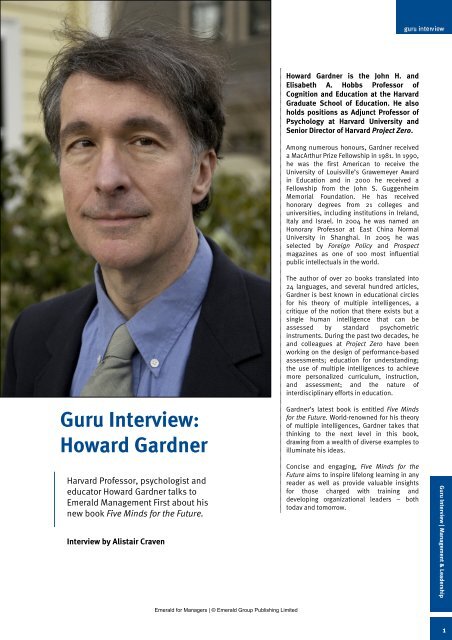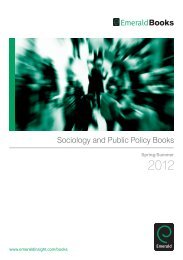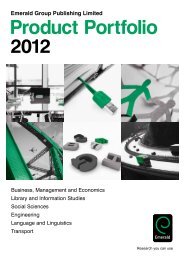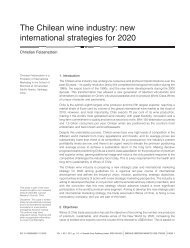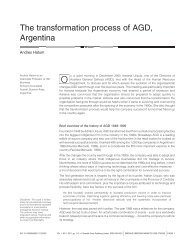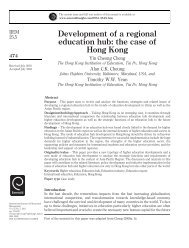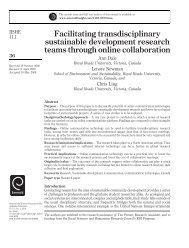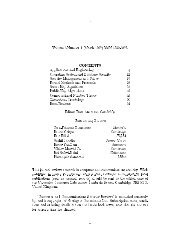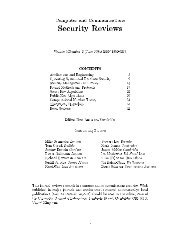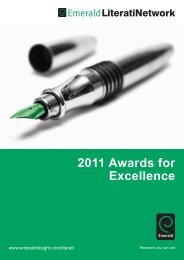Guru Interview: Howard Gardner
Guru Interview: Howard Gardner
Guru Interview: Howard Gardner
You also want an ePaper? Increase the reach of your titles
YUMPU automatically turns print PDFs into web optimized ePapers that Google loves.
<strong>Guru</strong> <strong>Interview</strong>:<br />
<strong>Howard</strong> <strong>Gardner</strong><br />
Harvard Professor, psychologist and<br />
educator <strong>Howard</strong> <strong>Gardner</strong> talks to<br />
Emerald Management First about his<br />
new book Five Minds for the Future.<br />
<strong>Interview</strong> by Alistair Craven<br />
Emerald for Managers | © Emerald Group Publishing Limited<br />
<strong>Howard</strong> <strong>Gardner</strong> is the John H. and<br />
Elisabeth A. Hobbs Professor of<br />
Cognition and Education at the Harvard<br />
Graduate School of Education. He also<br />
holds positions as Adjunct Professor of<br />
Psychology at Harvard University and<br />
Senior Director of Harvard Project Zero.<br />
Among numerous honours, <strong>Gardner</strong> received<br />
a MacArthur Prize Fellowship in 1981. In 1990,<br />
he was the first American to receive the<br />
University of Louisville’s Grawemeyer Award<br />
in Education and in 2000 he received a<br />
Fellowship from the John S. Guggenheim<br />
Memorial Foundation. He has received<br />
honorary degrees from 21 colleges and<br />
universities, including institutions in Ireland,<br />
Italy and Israel. In 2004 he was named an<br />
Honorary Professor at East China Normal<br />
University in Shanghai. In 2005 he was<br />
selected by Foreign Policy and Prospect<br />
magazines as one of 100 most influential<br />
public intellectuals in the world.<br />
The author of over 20 books translated into<br />
24 languages, and several hundred articles,<br />
<strong>Gardner</strong> is best known in educational circles<br />
for his theory of multiple intelligences, a<br />
critique of the notion that there exists but a<br />
single human intelligence that can be<br />
assessed by standard psychometric<br />
instruments. During the past two decades, he<br />
and colleagues at Project Zero have been<br />
working on the design of performance-based<br />
assessments; education for understanding;<br />
the use of multiple intelligences to achieve<br />
more personalized curriculum, instruction,<br />
and assessment; and the nature of<br />
interdisciplinary efforts in education.<br />
<strong>Gardner</strong>’s latest book is entitled Five Minds<br />
for the Future. World-renowned for his theory<br />
of multiple intelligences, <strong>Gardner</strong> takes that<br />
thinking to the next level in this book,<br />
drawing from a wealth of diverse examples to<br />
illuminate his ideas.<br />
Concise and engaging, Five Minds for the<br />
Future aims to inspire lifelong learning in any<br />
reader as well as provide valuable insights<br />
for those charged with training and<br />
developing organizational leaders – both<br />
today and tomorrow.<br />
<strong>Guru</strong> <strong>Interview</strong> | Management & Leadership 1
Your formal discipline is psychology, and you<br />
state that it took you a decade to “think like a<br />
psychologist.” What do you mean by this?<br />
<strong>Howard</strong> <strong>Gardner</strong>:<br />
When I hear any kind of empirical claim about<br />
human beings, I almost automatically think “how<br />
could one test this?” So, if someone says “you<br />
know, women speak more fluently than men,<br />
everyone knows that, I say to myself “oh , yea,<br />
what’s your measure, how could I convince you<br />
that you were wrong – or convince myself that I<br />
was wrong.” My wife is a research psychologist<br />
as well, and while we often disagree about<br />
substantive claims, we typically arrive at similar<br />
ways of testing those claims. That way of<br />
thinking takes many months to develop and<br />
several years to become intuitive and almost<br />
automatic.<br />
You have many years of experience in<br />
management and have “the lessons and battle<br />
scars to show for it.” Can you share a couple with<br />
us?<br />
<strong>Howard</strong> <strong>Gardner</strong>:<br />
As an observer, I have seen excellent deans and<br />
presidents at Harvard, as well as ones who<br />
showed how NOT to manage or lead. I have<br />
written about this and have tried to learn from the<br />
errors as well as the positive examples. As the<br />
long time head of a research group (essentially<br />
for 35 years, 28 with official responsibility), I<br />
made almost all the mistakes that one could<br />
make, and hope that I’ve learned not to repeat<br />
them. To mention just two:<br />
• I used to try to hire people who were<br />
like me. Now I realize that is precisely<br />
the wrong thing to do. I should hire<br />
people who have complementary skills,<br />
who can teach me and I can teach them.<br />
• I used to try to be friends with those<br />
whom I hire. It is great to get along with<br />
your employees and to enjoy their<br />
company. But as manager leader, my<br />
job is to get the job done, to be<br />
respected for what I stand for and how I<br />
proceed, and to help my associates<br />
develop. It is not to be liked; if I am<br />
liked, that is a bonus.<br />
In the book you claim that current formal<br />
education still prepares students primarily for<br />
the world of the past rather than for possible<br />
worlds of the future. Why do you hold this<br />
belief? What can be done about the situation?<br />
<strong>Howard</strong> <strong>Gardner</strong>:<br />
Emerald for Managers | © Emerald Group Publishing Limited<br />
Education changes very slowly and that is not all<br />
bad. But it is anachronistic when the world is<br />
changing very quickly. To compound problems,<br />
people tend to teach what they were taught and<br />
the way that they were taught; and rarely are<br />
there rewards for keeping up, and revising<br />
methods and content appropriately – especially<br />
not at the pre-collegiate level. Political entities<br />
that are small, future oriented, and run in a<br />
somewhat autocratic way are the most successful<br />
at shifting course – that is why Singapore leads<br />
in so many respects. But on the other hand, while<br />
I admire Singapore, I would not want to live there<br />
myself. In the US, while we have some excellent<br />
public and independent schools, most educators<br />
lead lives of quiet desperation and cannot expect<br />
to act as an avant garde, let alone a reflective<br />
one. In the countries that are most effective<br />
educationally, like Finland and Japan (which<br />
differ in so many other respects), teachers are<br />
respected.<br />
What is the crossover between your theory of<br />
interdisciplinary syntheses and cross-functional<br />
collaboration that we hear so much about in<br />
today’s workplace?<br />
<strong>Howard</strong> <strong>Gardner</strong>:<br />
I am sure that these concepts are related – mine<br />
comes more out of psychology/epistemology, the<br />
latter comes from business/organizational<br />
management literature. It is not enough for<br />
different groups/sectors/teams to work together<br />
or seek to be synergistic.<br />
“Creativity is inevitably<br />
unpredictable and unruly.<br />
Unless the leadership /<br />
management realizes this,<br />
gives members a good deal of<br />
slack, and, most importantly,<br />
respects the efforts and does<br />
not unduly penalize those some<br />
of whose ideas go nowhere,<br />
you won’t really have a<br />
creativity-fostering<br />
atmosphere.”<br />
My term and analysis emphasizes that<br />
individuals with different expertises have<br />
fundamentally different ways of thinking. If they<br />
are to work together, they must begin by<br />
respecting those other ways of thinking, and<br />
<strong>Guru</strong> <strong>Interview</strong> | Management & Leadership 2
trying, as much as possible, to fathom them and<br />
ultimately to internalize them. That’s the meaning<br />
of the passage quoted from John Seely Brown in<br />
the book.<br />
You mention in the book that in the past,<br />
knowledge accumulated far more gradually. From<br />
your experiences, are today’s managers really<br />
suffering from the so-called “information<br />
overload” syndrome?<br />
<strong>Howard</strong> <strong>Gardner</strong>:<br />
I know of no one who is immune these days from<br />
information overload. Perhaps it was always<br />
there but now it is more salient than ever. People<br />
work 80 or 90 hours a week and cant keep up<br />
with the deluge of information that is important<br />
for them to execute their work properly. The only<br />
solution is to develop ways to triage, to organize,<br />
to reorganize, to make use of the insights of<br />
others, and vice versa. That is what I mean when I<br />
say that the synthesizing mind will be the most<br />
valuable mind in our time and moving forward –<br />
at least until it is all done by some machine.<br />
You highlight an interesting dilemma with<br />
regard to organizational creativity. Although<br />
many organizations, as you put it, “…proclaim<br />
themselves as cradles of creativity”, they also<br />
signal that too much originality is “taboo.” Can<br />
you elucidate?<br />
<strong>Howard</strong> <strong>Gardner</strong>:<br />
Nowadays there are countless buzzphrases.<br />
Show me a university that does not say that it is<br />
training leaders. Show me a corporation that<br />
does not say that it wants all employees to<br />
contribute to consequential decision making.<br />
But the proof is in the doing. As explained in the<br />
next question, creativity is inevitably<br />
unpredictable and unruly. Unless the<br />
leadership/management realizes this, gives<br />
members a good deal of slack, and, most<br />
importantly, respects the efforts and does not<br />
unduly penalize those some of whose ideas go<br />
nowhere, you won’t really have a creativityfostering<br />
atmosphere. Companies like 3M and<br />
Google seem to stand out in this regard because<br />
the leaders themselves are creators and they<br />
build time and support for creation into the daily<br />
DNA of the organization – not just in annual<br />
reports to stockholders or statements to the<br />
business press.<br />
You highlight Enron as a stark example of<br />
pseudo creativity and argue that “undisciplined<br />
creativity is creativity undermined.” What steps<br />
can organizations take to bring a disciplined<br />
approach to creativity and idea management?<br />
<strong>Howard</strong> <strong>Gardner</strong>:<br />
Emerald for Managers | © Emerald Group Publishing Limited<br />
By its nature, creativity is an unruly process; you<br />
can’t and should not stop the mind from thinking<br />
anything that it wants. But at a certain point, one<br />
has to bring judgment, discrimination, the ‘blue<br />
pencil’ of editing to bear. That is where Enron fell<br />
short. No one said “that may sound like a great<br />
idea, but here are the four reasons why we<br />
should NEVER go in that direction.” The more<br />
that both creation and critique are built into daily<br />
operations, the more likely you will have an<br />
organization that embodies both creativity and<br />
discipline.<br />
You talk at length about the ethical mind. Can<br />
organizations truly pursue the dual ambitions of<br />
maximizing profits and striving toward being a<br />
socially responsible entity?<br />
<strong>Howard</strong> <strong>Gardner</strong>:<br />
As long you are concerned to increase profits<br />
each quarter, the answer is definitely no. Only<br />
those organizations that take the long view, make<br />
it clear that they are doing so, and establish a<br />
deserved reputation for reliability and integrity,<br />
can ultimately be both profitable and<br />
responsible. Johnson and Johnson has done<br />
well over recent decades. I look to google.com as<br />
a possible positive example in future years.<br />
In summing up you alert us to the problem of<br />
resistance. Do you think resistance to change<br />
can ever be a positive force?<br />
<strong>Howard</strong> <strong>Gardner</strong>:<br />
Of course, I wish that there had been more<br />
resistance to Hitler, Stalin, and Mao Zedong from<br />
day one. Change in itself is neither good nor bad;<br />
one has to consider the values that are<br />
sustaining stasis or calling for change, who<br />
espouses them, what are benefits and costs. And<br />
as the list above testifies, you must do so before<br />
it is too late. Eternal vigilance….<br />
Can you tell us a little about Harvard’s Project<br />
Zero of which you are Senior Director?<br />
<strong>Howard</strong> <strong>Gardner</strong>:<br />
HPZ began forty years ago and I was present at<br />
the creation and co-directed it for 28 years. Our<br />
original charge was to carry out basic empirical<br />
and conceptual research on the arts and arts<br />
education. Now, while maintaining a focus on the<br />
arts, we look at human cognitive capacities<br />
broadly, and think about how to nurture young<br />
(and not so young) minds. I always say “at Project<br />
Zero, we develop ideas about the mind and give<br />
those ideas a push in the right direction.’ For<br />
more, see:<br />
http://pzweb.harvard.edu<br />
<strong>Guru</strong> <strong>Interview</strong> | Management & Leadership 3
http://www.howardgardner.com<br />
http://goodworkproject.org<br />
Finally, what interests you outside of your<br />
professional life, and why?<br />
<strong>Howard</strong> <strong>Gardner</strong>:<br />
My biggest involvement is my family – my wife,<br />
four children, and first grand child, and my<br />
mother, age 95 and still going strong. I love the<br />
arts and listen always to music and attend as<br />
many concerts, plays, and museum exhibitions<br />
as I can, especially when travelling. Sometimes, I<br />
play the piano, though not well any longer. I<br />
serve on the board of the New York Museum of<br />
Modern Art and like the mix of responsibilities<br />
and experiences afforded by the position. □<br />
Five Minds for the Future is published by Harvard<br />
Business School Press and distributed by<br />
McGraw-Hill in Europe:<br />
http://www.mcgraw-hill.co.uk/harvard<br />
Emerald for Managers | © Emerald Group Publishing Limited<br />
<strong>Guru</strong> <strong>Interview</strong> | Management & Leadership 4


